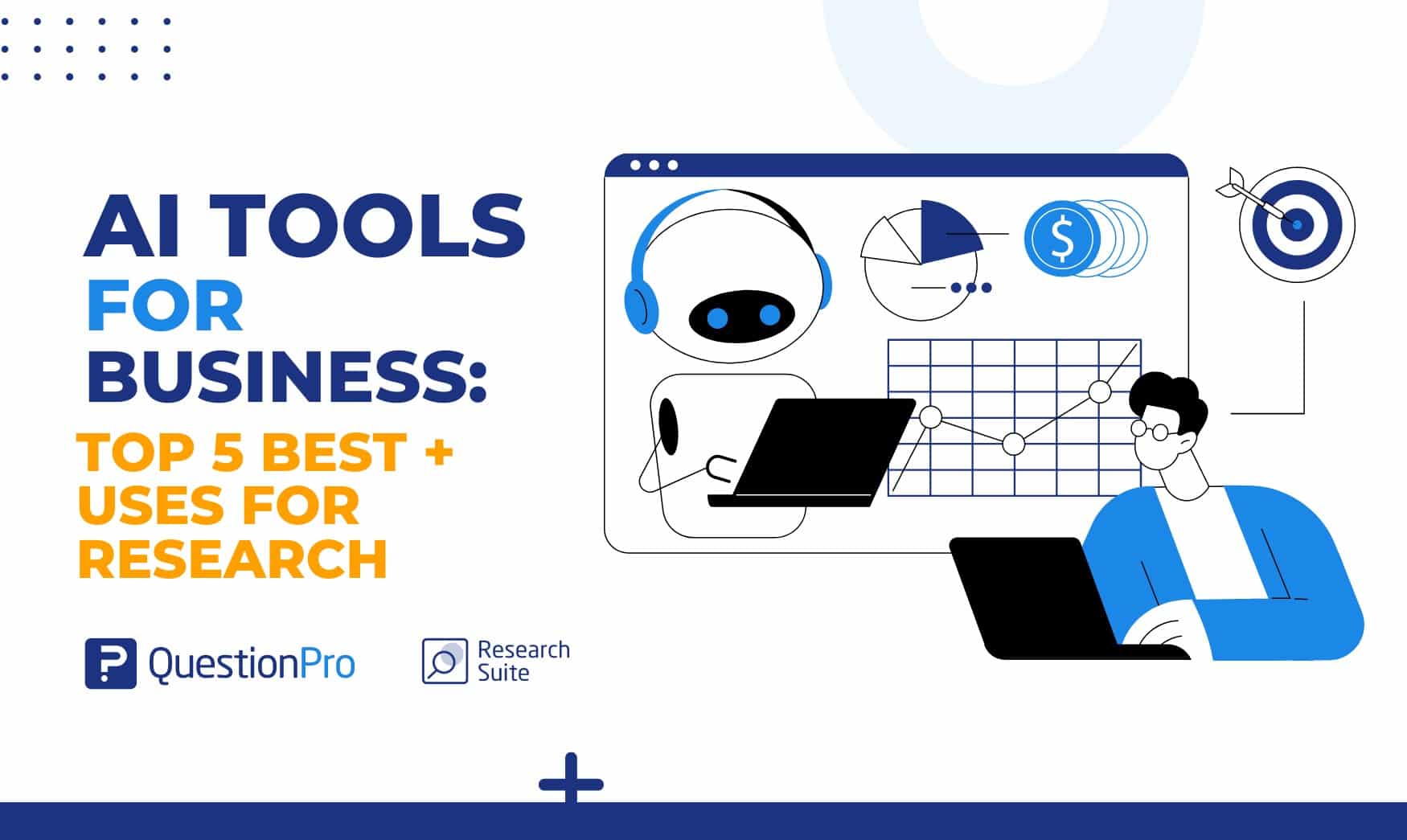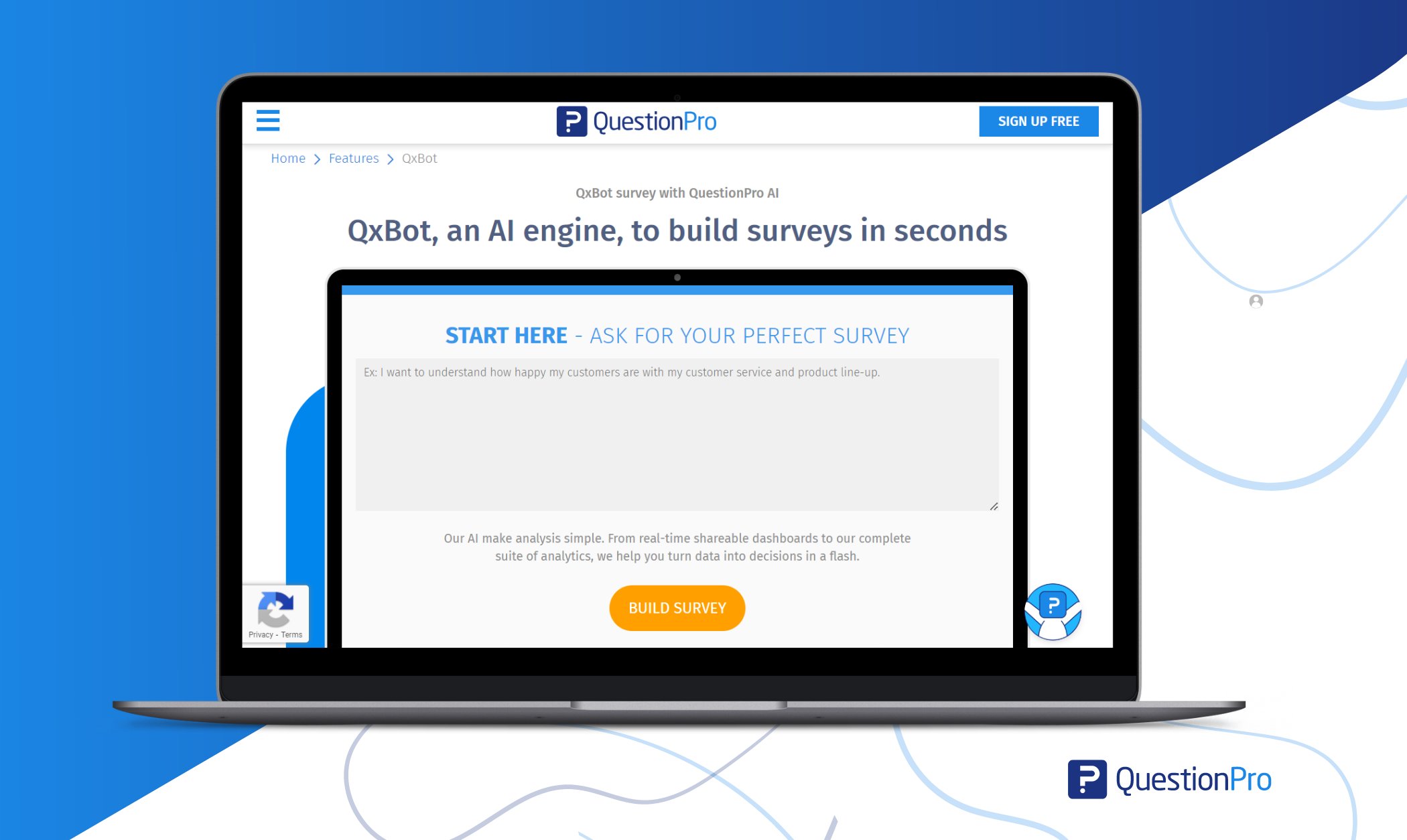
Artificial Intelligence (AI) is revolutionizing the business and research landscapes, transforming how organizations operate and innovate. No longer a futuristic concept, AI tools have become essential for enhancing productivity, improving customer experiences, and driving data-driven decision-making.
From predictive analytics that forecast market trends to chatbots that provide instant customer support, AI empowers businesses to streamline operations and gain valuable insights. In research, AI accelerates data analysis, enabling deeper understanding across disciplines.
This blog explores the significance of AI tools and their diverse applications and highlights the top five tools reshaping industries today.
What Are AI Tools for Business?
AI tools for business are software systems equipped with intelligent algorithms designed to mimic human cognitive processes. These tools utilize machine learning (ML), deep learning, and neural networks to analyze data, adapt to new information, and make decisions that drive productivity and innovation.
In business, AI tools automate processes, enhance customer interactions, streamline operations, and uncover valuable insights from massive datasets.
For businesses, AI-powered tools are integral for staying competitive in the digital age. They assist in analyzing consumer behavior, predicting trends, and automating customer support. Meanwhile, in research, AI opens doors to quicker data analysis and comprehensive insights across various disciplines.
What is AI used in Business?
AI tools significantly boost business growth, efficiency, and innovation. Some key applications of AI in business include:
- Customer Experience Enhancement: AI can analyze customer behavior to deliver personalized experiences, such as recommendation systems on platforms like Amazon or Netflix. AI tools curate tailored suggestions by understanding user preferences and improving customer satisfaction and loyalty.
- Predictive Analytics: AI tools can analyze past data to forecast trends, enabling businesses to make proactive decisions. For example, retailers can predict product demand, optimize inventory, and manage supply chains. AI also aids financial institutions by detecting fraudulent activities in real-time, ensuring security, and reducing losses.
- Automating Customer Support: AI-powered chatbots and virtual assistants automate customer service, handling inquiries and providing 24/7 support. This allows human agents to focus on complex issues while customers receive immediate assistance, increasing engagement and satisfaction.
- Supply Chain Optimization: AI tools analyze and streamline supply chain operations, making logistics more efficient. AI helps businesses reduce operational costs and improve delivery times, from demand forecasting to warehouse management.
- Data-Driven Decision Making: AI empowers companies to process vast datasets quickly, extracting actionable insights. For example, manufacturers use AI for predictive maintenance, preventing machinery breakdowns by analyzing real-time data.
Top 5 AI Tools for Business
Now, let’s explore the top 5 AI tools that are transforming the business landscape:

1. Chatbots and Virtual Assistants
These AI-driven tools have revolutionized customer service by providing instant support. They handle everything from answering common questions to guiding users through troubleshooting processes. Major businesses like e-commerce and telecom companies use AI chatbots to engage customers, allowing human representatives to focus on more intricate queries.
Use Case: Businesses utilize chatbots to offer 24/7 customer service, reducing the need for human intervention in routine queries and ensuring timely responses.
2. Predictive Analytics
Predictive analytics tools use AI algorithms to analyze historical data and forecast future outcomes. This allows businesses to make data-driven decisions and anticipate customer needs or market changes. It is widely used in industries such as retail for inventory management and financial services for risk assessment.
Use Case: Retailers use predictive analytics to optimize stock levels based on sales trends, minimizing inventory costs while preventing stockouts.
3. Natural Language Processing (NLP)
NLP is used to analyze and understand human language. AI-powered NLP tools can interpret customer feedback, reviews, and social media interactions, extracting insights into customer sentiment and preferences. This technology powers chatbots, language translation tools, and personalized content recommendations.
Use Case: E-commerce websites use NLP to provide personalized product recommendations based on customer reviews and preferences.
4. Robotic Process Automation (RPA)
RPA automates repetitive business tasks such as data entry, invoice processing, and compliance reporting. By mimicking human actions, RPA ensures consistency, reduces errors, and frees employees to focus on higher-level strategic work.
Use Case: Financial institutions use RPA to process loan applications by automating data entry and verification, reducing processing time from days to minutes.
5. Machine Learning Platforms
Machine learning platforms enable businesses to build, deploy, and scale custom AI models. These platforms are essential for industries requiring tailored solutions, such as fraud detection, recommendation systems, and risk management. With machine learning, businesses can improve their models by learning from new data inputs.
Use Case: Banks use machine learning platforms to detect fraudulent transactions by analyzing real-time transaction patterns and identifying anomalies.
5 Best AI Market Research Software
AI-driven market research tools are crucial for businesses seeking deep insights and making informed decisions in today’s competitive environment. Here’s an in-depth look at some of the top AI market research tool options available, featuring QuestionPro QxBot, among others.
- QuestionPro QxBot
QxBot is an advanced AI-driven chatbot designed to enhance the market research process. It engages respondents in conversational surveys, making data collection more interactive and user-friendly.

Key Features:
- Conversational Surveys: QxBot engages respondents through interactive, conversational formats, creating a more engaging and user-friendly data collection experience.
- Natural Language Processing (NLP): Employs advanced NLP technology to analyze responses in real-time, enabling researchers to extract richer insights from open-ended questions.
- Personalization: The bot personalizes interactions based on user inputs, significantly boosting response rates and improving the quality of collected data.
- Automated Reporting: Generates insights automatically, providing immediate feedback and summaries for researchers.
Benefits: By creating a dynamic and responsive survey environment, QxBot helps organizations gather more nuanced data, enhancing the overall quality of conducting market research outcomes.
02. SurveyMonkey
SurveyMonkey employs AI to streamline survey creation and analysis. Its smart survey features provide question suggestions based on your objectives, while powerful analytics tools help visualize data trends.
Key Features:
- Smart Survey Suggestions: Uses AI to offer question suggestions tailored to your research objectives, simplifying survey design.
- Data Visualization Tools: Provides robust analytics tools to visualize data trends, making it easier for users to interpret results.
- Sentiment Analysis: Incorporates tools for sentiment analysis, allowing researchers to gauge participant feelings and opinions effectively.
- Customizable Templates: Offers a range of templates that can be easily customized to fit specific research needs.
Benefits: SurveyMonkey enhances the efficiency of survey administration, enabling organizations to focus on analysis and insights rather than just data collection.
03. Qualtrics
Qualtrics is a robust platform that combines AI with comprehensive survey capabilities. Its predictive intelligence feature identifies patterns in data, helping organizations anticipate market shifts.
Key Features:
- Predictive Intelligence: Identifies patterns and trends in data, helping organizations forecast market changes and consumer behavior.
- Automated Insights: Offers actionable recommendations from the collected data, enhancing strategic decision-making.
- Integrated Reporting: Provides customizable reports highlighting key findings and metrics relevant to stakeholders.
- Collaboration Tools: This tool features capabilities for team collaboration, allowing multiple users to access and analyze data in real time.
Benefits: Qualtrics empowers businesses to use predictive analytics to understand market dynamics better, enabling timely and informed strategic adjustments.
04. Zappi
Zappi specializes in automated insights for product testing and brand tracking. Utilizing AI algorithms, it delivers real-time feedback on concepts and advertising campaigns, helping businesses optimize their strategies quickly.
Key Features:
- Real-Time Feedback: Utilizes AI algorithms to deliver instant insights on concepts, advertising campaigns, and other market initiatives.
- User-Friendly Interface: Designed for ease of use, enabling rapid testing and iteration, essential for agile teams.
- Integration Capabilities: Easily integrates with other tools and platforms, streamlining workflows and data management.
- Customizable Dashboards: Users can create dashboards to monitor key performance indicators and insights in a visually appealing format.
Benefits: Zappi accelerates the optimization of marketing strategies, making it easier for teams to adapt quickly based on real-time feedback and insights.
05. Brandwatch
Brandwatch harnesses AI for social listening and brand analysis. It monitors online conversations, giving businesses insights into consumer sentiment and emerging trends. Its visual analytics tools help identify key topics and influencers, enabling effective marketing strategies.
Key Features:
- Consumer Sentiment Monitoring: Tracks and analyzes online conversations to provide insights into consumer perceptions and trends.
- Visual Analytics Tools: Offers powerful visualization features that help identify key topics, influencers, and engagement metrics.
- Competitor Analysis: Provides tools for monitoring competitor activity and benchmarking against industry standards.
- Custom Alerts: Users can set up alerts for significant shifts in sentiment or notable brand mentions across social media platforms.
Benefits: Brandwatch equips businesses with critical insights to develop effective marketing strategies and strengthen brand positioning.
These AI market research tools, including QuestionPro QxBot, are revolutionizing how businesses gather and analyze data, driving smarter decisions and fostering innovation.
How are AI Tools For Business Used in Research?
AI has transformed the research landscape by enhancing data analysis’s speed, accuracy, and depth. Across various disciplines, researchers can harness AI tools to process vast datasets, identify patterns, and uncover insights that might have been missed through traditional methods. Here’s how AI is revolutionizing research:
Medical Research
In healthcare, AI analyzes medical images, predicts disease outbreaks, and even assists in drug development. AI’s ability to process large datasets allows researchers to make more accurate diagnoses, predict patient outcomes, and personalize treatment plans.
Social Sciences
AI tools like sentiment analysis allow researchers to analyze public opinions on social issues by extracting data from social media platforms. This enables researchers to identify trends and correlations in public sentiment that would otherwise be difficult to track.
Scientific Discovery
AI-powered algorithms accelerate scientific discovery by identifying correlations and trends within complex data. From genomics to environmental research, AI can process data at speeds unattainable by human researchers alone.
Natural Language Processing (NLP)
NLP tools enable researchers to analyze and categorize vast amounts of text data. This technology is particularly useful in fields like law and education, where vast textual datasets require parsing for trends and insights.
Conclusion
In conclusion, integrating AI tools into business and market research analysis has ushered in a new era of possibilities. From optimizing operations to accelerating research, these tools are catalysts for innovation and efficiency. To stay competitive and relevant in this dynamic environment, businesses and researchers must embrace AI tools and harness their transformative potential.
Unlock the full potential of AI tools alongside QuestionPro’s Research Suite to drive transformative insights for your business and research initiatives. Dive into the world of AI-powered solutions and discover how seamlessly they can complement our platform, elevating your strategies and propelling your organization’s growth.
Don’t miss out on the future of data-driven decision-making—QuestionPro is the perfect partner for integrating AI tools and supercharging your success!







